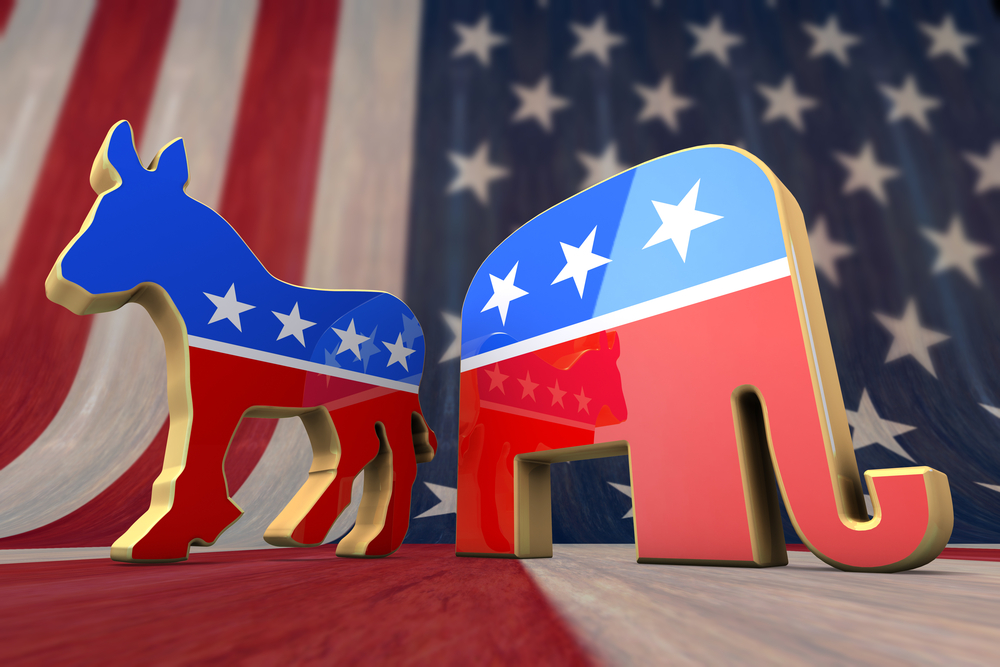We’ve Got Politics Wrong

In the heat of partisan divisions, it is tempting to think different sides of the dispute are deeply committed to distinct and irreconcilable political and moral principles and values that explain their disagreement: partisan rifts are about ideology, not party affiliation. However, despite the intuitive appeal of this view, we have good evidence that it’s backwards: party affiliation trumps ideology. Understanding why will clarify our thinking about politics.
First, let’s begin with an unnerving fact: your single vote doesn’t matter to the outcome of an election (except in astronomically rare cases). It isn’t hard to see why: in a large democracy, for your vote to count, it must break a tie. But there are scant opportunities for your individual vote to break any ties. As a Louisiana resident, voting in the upcoming presidential election is highly unlikely to make a difference; the state will be carried by the Republican. And the same holds, to varying degrees, up and down the ballot.
You may object that “even if an individual vote doesn’t matter in deeply blue and red states, the same isn’t true of swing states.” A swing state is likely the best chance one has to decide an election outcome with a single vote. Even this is highly unlikely: an optimistic estimate is that an individual vote has a 1-in-10 million chance, and on average about a 1-in-60 million chance, of deciding the outcome of an election. Just to get a feel for the odds: this is roughly equivalent to the odds of winning a state lottery twice. (Since no one rationally thinks that will happen, we should think the same of deciding an election with a single vote).
When I bring this point up, people often cite the U.S. Presidential election in 2000 as a case where a few votes mattered a lot. However, this is a poor response for a couple reasons. First, the fate of that election was ultimately decided by the courts; so there’s a sense in which even in that rare case, individual votes didn’t matter. Second, the fact that something unlikely happens — like someone winning the lottery — doesn’t show it will likely happen again. The fact that we focus on that particular example, at least in American politics, is itself revealing.
Partisan affiliation trumps ideology partly because a single vote doesn’t effectively influence policy; but it can signal allegiance to those in one’s tribe. The incentives at play are revealing: voters are rationally ignorant because it is rational for them to be politically ignorant. Indeed, the average voter lacks the most basic of political knowledge: which party controls the White House; which party is in favor of banning abortion; which party supports free trade. There are many examples like this. There are poor incentives to be politically informed: if an individual vote is incredibly unlikely to decide the outcome of an election, voters lack the incentive to be politically informed. It would make sense to be informed if an individual vote would likely make a difference; one would want to study to ensure their vote had the desired impact.
Sometimes political commentators argue voting only takes a few hours: one must register, pick their preferred candidates, and then vote. This is nonsense. It would only make sense if voting didn’t require knowledge. However, we should vote well if we’re going to vote; even if a single vote won’t influence the outcome of an election, voting badly in aggregate does. And voting well requires substantial expertise in economics, foreign affairs, and educational policy, to name but a few. Voting well is costly too: it is hard to undertake, requiring thousands of hours, and with high opportunity costs.
Worse still, even if someone is informed enough to vote well, there is no guarantee that they will; there’s a good chance they’ll vote badly for reasons unrelated to how informed they are. We are susceptible to what psychologists call ‘motivated reasoning’: the unconscious tendency to find arguments for conclusions we want to believe stronger than arguments for conclusions we dislike. A creationist may require a low level of evidence for her view, but require that evidence for evolution meet a much higher evidential bar. Likewise, a smoker may dismiss studies showing a link between cigarette smoke and cancer, but accept similar studies showing a relationship between trans-fat and heart disease. Consider a real-time example: the partisan divide over police and teachers’ unions. Democrats favor the latter, but not the former; Republicans are the reverse. This is odd: if one thinks police unions are corrupt because it is very hard to fire a bad cop, then by similar reasoning they should think teachers’ unions corrupt too (and vice versa). If, however, support for one’s preferred union were an exercise in signaling partisan affiliation, this strange mix of policy positions would make sense.
Everyone engages in motivated reasoning; but the more politically informed someone is, the more likely they are to engage in such reasoning. Perhaps greater political knowledge enables one to better defend their prior convictions. This speaks to an epistemic paradox at the heart of democracy: we can’t vote well without sufficient expertise; but the more politically informed we are, the more likely we are to engage in politically motivated reasoning. This is why some philosophers argue it would often be morally better to ignore politics. We lack the incentives and psychological objectivity to vote well. And given the opportunities costs of voting well, and that an individual vote isn’t worth much, civic-minded citizens among us, who sincerely want to make the world a better place, would be better off doing something other than voting, like say, working at a homeless shelter.




